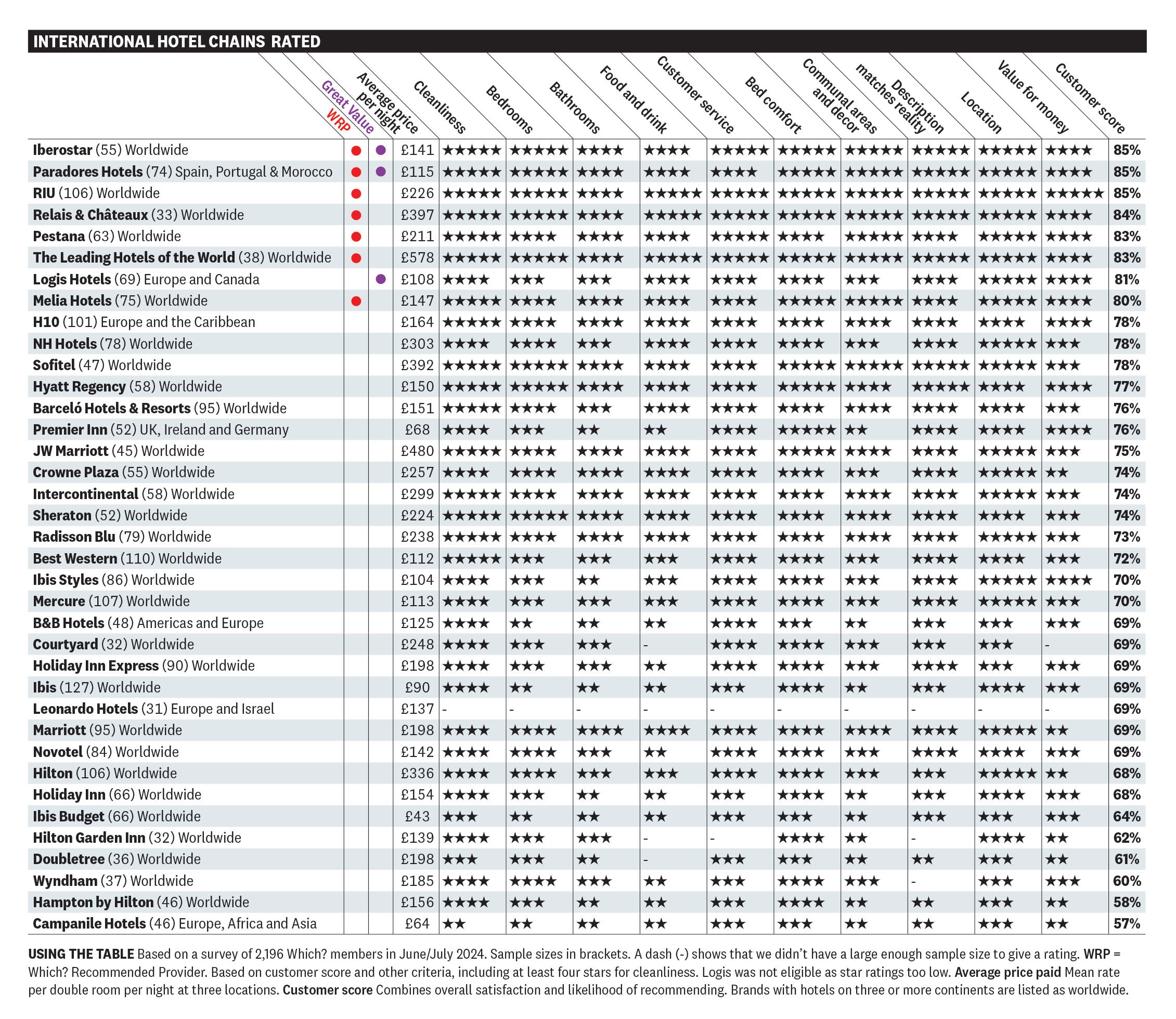The best and worst hotel brands revealed
Iberostar, Paradores and RIU came joint-first in the Which? survey

Your support helps us to tell the story
From reproductive rights to climate change to Big Tech, The Independent is on the ground when the story is developing. Whether it's investigating the financials of Elon Musk's pro-Trump PAC or producing our latest documentary, 'The A Word', which shines a light on the American women fighting for reproductive rights, we know how important it is to parse out the facts from the messaging.
At such a critical moment in US history, we need reporters on the ground. Your donation allows us to keep sending journalists to speak to both sides of the story.
The Independent is trusted by Americans across the entire political spectrum. And unlike many other quality news outlets, we choose not to lock Americans out of our reporting and analysis with paywalls. We believe quality journalism should be available to everyone, paid for by those who can afford it.
Your support makes all the difference.Three lesser-known Spanish hotel chains are favoured among guests as the best international hotel brands, beating out some big names such as Hilton and Holiday Inn, a new Which? survey has revealed.
Iberostar, Paradores and RIU came joint-first in a table ranking international hotel brands based on a survey carried out by 2,000 Which? members.
The lowest-scoring brand overall is French-owned Campanile, which received an overall customer score of just 57 per cent.
The survey asked people about their experiences staying at international hotel brands in the past year, receiving responses for 37 chains.
Respondents were asked to rate their stays out of five stars across 10 criteria, including cleanliness, bed comfort, customer service and value for money.
A customer score was then calculated based on overall satisfaction and likelihood of recommending the brand.
While Iberostar was originally founded by a family of artisan shoemakers from Mallorca, today the hotel chain has more than 100 four and five-star hotels across Europe, Africa and the Americas.
Iberostar offers beachfront, city and heritage hotels, as well as their own luxury line JOIA, with the brand receiving four or five stars across all categories, culminating in an 85 per cent customer score.
Many respondents said they would be eager to return and praised the hotels’ “first class” customer service and “beautiful” grounds.
Also with an 85 per cent customer score overall was RIU, another family business with roots in Mallorca.

RIU received five stars for its locations, which range from a private island in the Maldives to an all-inclusive family resort in Gran Canaria.
Its food and drink offerings also received five stars from guests, and the entire experience was described as “fabulous”, “exceptional” and “excellent”.
The third hotel brand to tie in first place in Paradores, with a score of 85 per cent. It provides state-run Spanish hotels in some impressive buildings, including restored castles, palaces and monasteries.
The brand received a run of five and four-star ratings, with visitors noting the “excellent service, excellent food, and fantastic buildings”.
At the other end of the Which? list is Campanile, whose hotels are often found near airports or city centres in France, but also have spots in around 13 other countries.
The 400-hotel-strong brand often has hotels equipped with co-working spaces and professional conference spaces.
Some respondents were satisfied with their stay at the brand’s hotels, saying it “did what it said on the tin” and worked well for a one-night stay.
However, despite being one of the cheapest average room rates compared to the other brands surveyed, coming in at £64 for a double, the low-priced stays still only received a two-star rating for value for money.
Read more: Best luxury hotels in Tenerife
Campanile also scored just two stars in other key categories including cleanliness, bathrooms, bedrooms and communal areas, with one respondent saying the rooms were “basic”.
The second-lowest was Hampton by Hilton, with a customer score of just 58 per cent, receiving only two stars across categories such as value for money, bathrooms, food and drink, communal areas, and how well the description matched reality.
One respondent reported that the hotel they stayed in was “generally run down”, while another said the food was “relatively basic and poor”.
However, the Hilton brand performed better in other categories, such as scoring four stars for cleanliness and bed comfort, with one guest describing their room as “clean and comfy”.
Other Hilton-owned brands such as Doubletree (61 per cent), Hilton Garden Inn (62 per cent) and Hilton (68 per cent) also ended up placing at the lower end of the table.
Further lower-ranking brands included Wyndham (60 per cent), Holiday Inn (68 per cent) and Ibis Budget (64 per cent).
A spokesperson for Ibis Budget said: “We are surprised to see our position in this survey, which does not reflect the standard of guest experience which we strive for. We will take action to address these comments.
“Our guest feedback, based on more than 9,000 reviews so far in 2024, scores ibis budget at approximately 80 per cent for key customer touchpoints, including staff, cleanliness and value for money.
“Moreover, guest sentiment, captured via TrustYou and based on independent reviews on Booking.com, Google, TripAdvisor and other platforms, also highlights the positive quality of ibis budget staff, resulting in 85 per cent of positive mentions about our service. The experience of our guests at each and every property is our number one priority.”
The Independent has contacted Campanile, Hilton, Holiday Inn and Wyndham Hotels or their wider hotel groups for comment.
For more travel news and advice, listen to Simon Calder’s podcast
Join our commenting forum
Join thought-provoking conversations, follow other Independent readers and see their replies
Comments